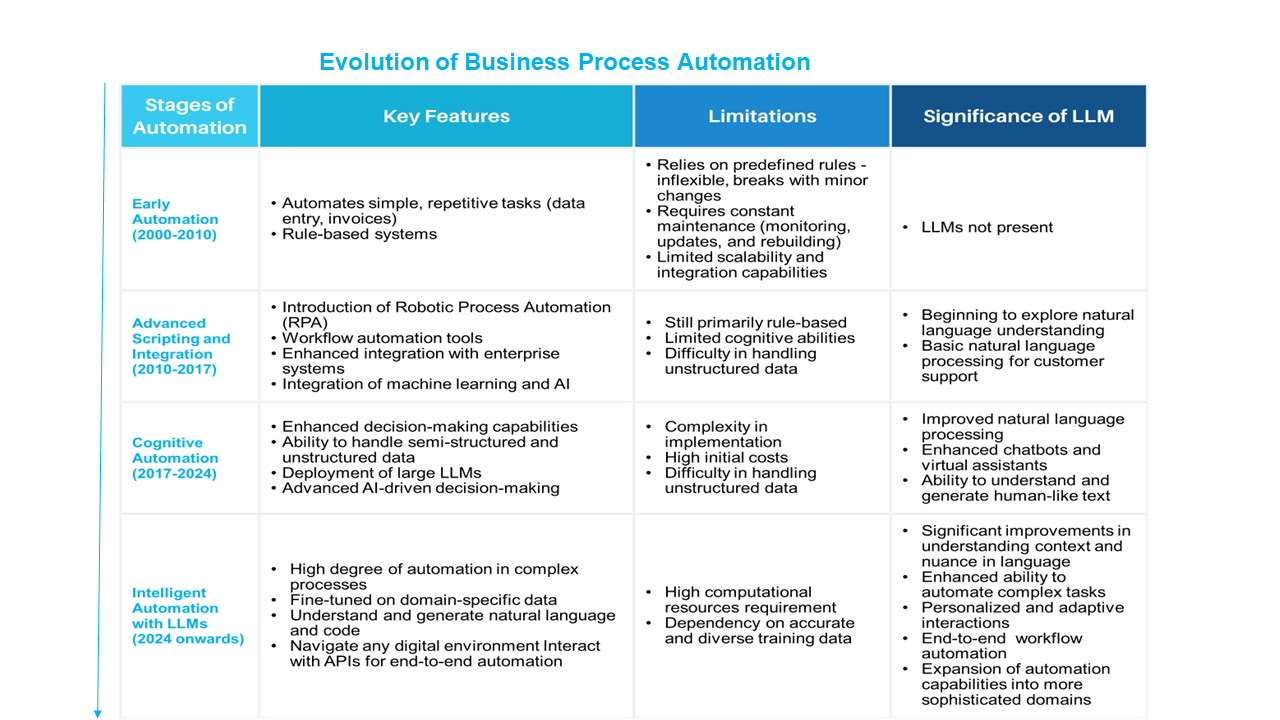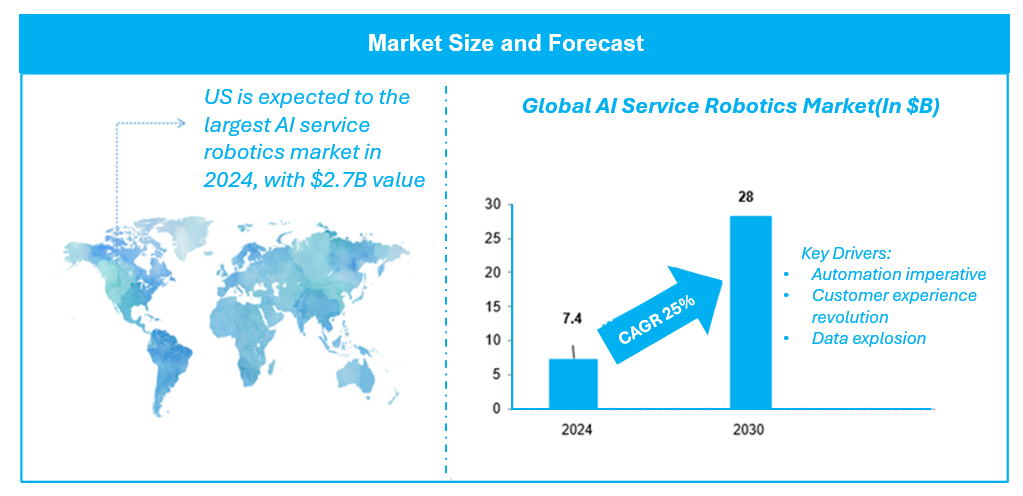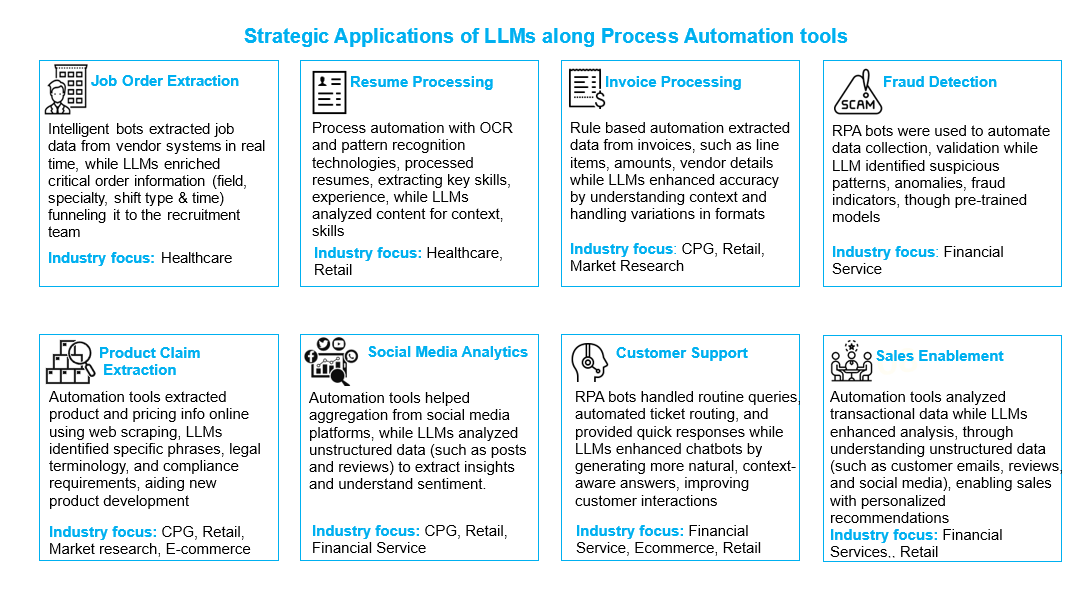Business process automation gained prominence two decades back, as organizations across diverse industries recognized its potential to streamline processes, reduce errors, and enhance efficiency. Initially focused on automating repetitive tasks, automation evolved significantly with technological advancements. While Robotic Process Automation (RPA) revolutionized automation with use software robots to handle high-volume, rule-based tasks, Digital Process Automation (DPA) emerged, integrating digital tools to enhance efficiency and customer experience. This was followed by Intelligent Process Automation (IPA), which incorporated artificial intelligence to enable more complex decision-making and predictive analytics.
Despite these advancements, there are certain limitations such as implementation complexity, inability of models to learn, adapt or improve over time, little or no understanding of natural language, which often lead to failure or automation projects. According to a recent survey by EY, up to 50% of initial RPA projects fail.
 The LLM powered automation, has immense transformative potential in the future of work. By automating complex tasks, enhancing decision-making, and enabling more dynamic workflows, this technology empowers organizations to increase productivity, reduce costs, and adapt to rapidly changing business environments.
The LLM powered automation, has immense transformative potential in the future of work. By automating complex tasks, enhancing decision-making, and enabling more dynamic workflows, this technology empowers organizations to increase productivity, reduce costs, and adapt to rapidly changing business environments.
 This growth is fueled by several factors including:
This growth is fueled by several factors including:

Transformative Potential of Large Language Models (LLMs)
Consider LLM as advanced language processors—large deep learning models pre-trained on extensive text data. This comprehensive training equips them with a profound understanding of human language, vastly expanding their potential applications in robotics. Notably, LLMs continuously learn and evolve, much like the human brain. As a result, automation models powered by LLM can consistently enhance their performance, refine their capabilities, and adapt to changing workflows. Imagine a customer service scenario handled by an LLM-powered robot. A customer emails with a complex product inquiry in their native language during off-hours. This LLM-powered bot not only understands the language, thanks to its pre-trained multilingual model, but also analyses past interactions and product knowledge to formulate a personalized and accurate response. This approach frees human agents for higher-value tasks and significantly improves scalability. Additionally, these AI bots operates 24X7 with high efficiency, boosting scalability tremendously. LLM-powered bots empower businesses to overcome traditional limitations, achieving higher levels of automation, operational efficiency, and profitability. The LLM powered automation, has immense transformative potential in the future of work. By automating complex tasks, enhancing decision-making, and enabling more dynamic workflows, this technology empowers organizations to increase productivity, reduce costs, and adapt to rapidly changing business environments.
The LLM powered automation, has immense transformative potential in the future of work. By automating complex tasks, enhancing decision-making, and enabling more dynamic workflows, this technology empowers organizations to increase productivity, reduce costs, and adapt to rapidly changing business environments.
Market Outlook
The transformative impact of LLM powered automation is driving widespread adoption, which is evidenced by robust market forecasts. According to market research firm Statista, the global AI-based service robotics market is projected to grow at a compound annual growth rate (CAGR) of 25% during 2024-30, to reach $28B by 2030. This growth is fueled by several factors including:
This growth is fueled by several factors including:
- Automation imperative: Businesses are seeking to automate repetitive tasks, freeing up human capital for higher-value activities. LLM can automate analysis, decision-making, and even communication aspects within these tasks.
- Customer experience revolution: Today’s customers demand personalized and efficient service. LLM enable service robots to understand natural language, answer questions in a conversational way, and provide 24/7 support, boosting customer satisfaction.
- Data explosion: Extracting insights from vast amounts of unstructured data is a challenge. LLM can analyze information from various sources, empowering data-driven decision-making and predictive analytics.
Business Benefits and Use Cases
The integration of Large Language Models (LLM) with business process automation is revolutionizing organizational efficiency and productivity. This powerful synergy enables intelligent data processing, enhanced customer interactions, and adaptive decision-making. At Blackstraw, we recognize that integrating Large Language Models (LLM) with process automation isn’t just an opportunity—it’s a strategic imperative. Our seasoned experts seamlessly navigate the complexities of automation and LLM, along with other cutting-edge AI technologies such as Machine Learning, Natural Language Processing, Computer Vision, and Deep Learning. This ensures flawless collaboration between automation and language understanding. We have harnessed the potential of LLM to drive business process automation, delivering significant benefits across various industries and functions. We have saved millions of dollars by automating data extraction from CPG purchase receipts, optimized healthcare staffing by processing millions of resumes to match thousands of jobs, reduced job order processing time by 85%, and achieved 93% accuracy in extracting data from multilingual invoices. Additionally, we have improved efficiency and product classification for a consumer intelligence company, reduced operational costs for a logistics company through zero-touch automation in invoice data extraction, and enhanced overall operational efficiency. The following list illustrates the comprehensive impact we have created in various business functions across industries.
Navigate Path to Success with Blackstraw
Imagine transforming your business processes to achieve unprecedented levels of operational efficiency and remarkable results. This is not just a possibility—it’s an exciting opportunity when you partner with us. We invite you to join us on a transformative journey of innovation and growth. By harnessing the synergistic power of Large Language Models (LLMs) and cutting-edge automation, we can propel your business into a new era of success and competitiveness. Contact us today to explore how our expertise can revolutionize your operations and drive your business forward. Let’s embark on this exciting journey together, turning your vision into reality with the advanced capabilities of AI.Ready to explore the possibilities of AI
for your business?
Talk to Us
for your business?

